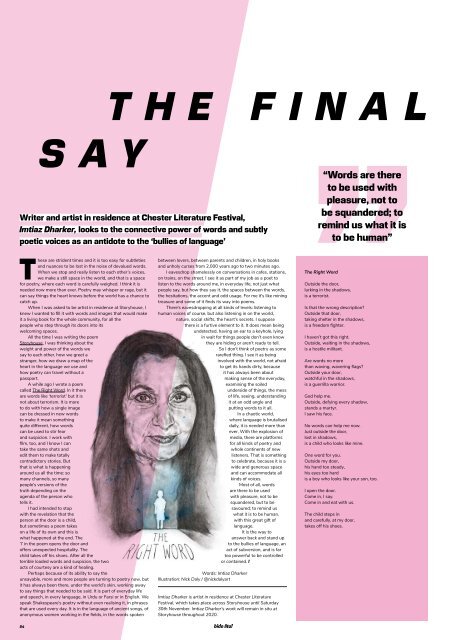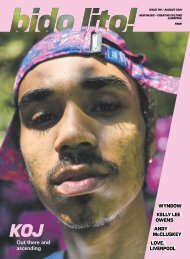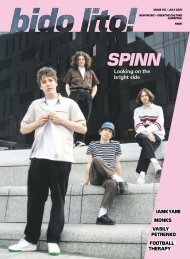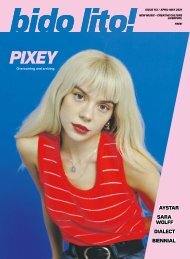Issue 106 / Dec 2019/Jan 2020
December 2019/January 2020 double issue of Bido Lito! magazine. Featuring: BEIJA FLO, ASOK, LO FIVE, SIMON HUGHES, CONVENIENCE GALLERY, BEAK>, STUDIO ELECTROPHONIQUE, ALEX TELEKO, SHE DREW THE GUN, IMTIAZ DHARKER and much more.
December 2019/January 2020 double issue of Bido Lito! magazine. Featuring: BEIJA FLO, ASOK, LO FIVE, SIMON HUGHES, CONVENIENCE GALLERY, BEAK>, STUDIO ELECTROPHONIQUE, ALEX TELEKO, SHE DREW THE GUN, IMTIAZ DHARKER and much more.
You also want an ePaper? Increase the reach of your titles
YUMPU automatically turns print PDFs into web optimized ePapers that Google loves.
THE FINAL<br />
SAY<br />
Writer and artist in residence at Chester Literature Festival,<br />
Imtiaz Dharker, looks to the connective power of words and subtly<br />
poetic voices as an antidote to the ‘bullies of language’<br />
“Words are there<br />
to be used with<br />
pleasure, not to<br />
be squandered; to<br />
remind us what it is<br />
to be human”<br />
These are strident times and it is too easy for subtleties<br />
and nuances to be lost in the noise of devalued words.<br />
When we stop and really listen to each other’s voices,<br />
we make a still space in the world, and that is a space<br />
for poetry, where each word is carefully weighed. I think it is<br />
needed now more than ever. Poetry may whisper or rage, but it<br />
can say things the heart knows before the world has a chance to<br />
catch up.<br />
When I was asked to be artist in residence at Storyhouse, I<br />
knew I wanted to fill it with words and images that would make<br />
it a living book for the whole community, for all the<br />
people who step through its doors into its<br />
welcoming spaces.<br />
All the time I was writing the poem<br />
Storyhouse, I was thinking about the<br />
weight and power of the words we<br />
say to each other, how we greet a<br />
stranger, how we draw a map of the<br />
heart in the language we use and<br />
how poetry can travel without a<br />
passport.<br />
A while ago I wrote a poem<br />
called The Right Word. In it there<br />
are words like ‘terrorist’ but it is<br />
not about terrorism. It is more<br />
to do with how a single image<br />
can be dressed in new words<br />
to make it mean something<br />
quite different, how words<br />
can be used to stir fear<br />
and suspicion. I work with<br />
film, too, and I know I can<br />
take the same shots and<br />
edit them to make totally<br />
contradictory stories. But<br />
that is what is happening<br />
around us all the time: so<br />
many channels, so many<br />
people’s versions of the<br />
truth depending on the<br />
agenda of the person who<br />
tells it.<br />
I had intended to stop<br />
with the revelation that the<br />
person at the door is a child,<br />
but sometimes a poem takes<br />
on a life of its own and this is<br />
what happened at the end. The<br />
‘I’ in the poem opens the door and<br />
offers unexpected hospitality. The<br />
child takes off his shoes. After all the<br />
terrible loaded words and suspicion, the two<br />
acts of courtesy are a kind of healing.<br />
Perhaps because of its ability to say the<br />
unsayable, more and more people are turning to poetry now, but<br />
it has always been there, under the world’s skin, working away<br />
to say things that needed to be said. It is part of everyday life<br />
and speech, in every language, in Urdu or Farsi or in English. We<br />
speak Shakespeare’s poetry without even realising it, in phrases<br />
that are used every day. It is in the language of ancient songs, of<br />
anonymous women working in the fields, in the words spoken<br />
between lovers, between parents and children, in holy books<br />
and unholy curses from 2,000 years ago to two minutes ago.<br />
I eavesdrop shamelessly on conversations in cafes, stations,<br />
on trains, on the street. I see it as part of my job as a poet to<br />
listen to the words around me, in everyday life, not just what<br />
people say, but how they say it, the spaces between the words,<br />
the hesitations, the accent and odd usage. For me it’s like mining<br />
treasure and some of it finds its way into poems.<br />
There’s eavesdropping at all kinds of levels: listening to<br />
human voices of course, but also listening in on the world,<br />
nature, social shifts, the heart’s secrets. I suppose<br />
there is a furtive element to it. It does mean being<br />
undetected, having an ear to a keyhole, lying<br />
in wait for things people don’t even know<br />
they are hiding or aren’t ready to tell.<br />
So I don’t think of poetry as some<br />
rarefied thing. I see it as being<br />
involved with the world, not afraid<br />
to get its hands dirty, because<br />
it has always been about<br />
making sense of the everyday,<br />
examining the soiled<br />
underside of things, the mess<br />
of life, seeing, understanding<br />
it at an odd angle and<br />
putting words to it all.<br />
In a chaotic world,<br />
where language is brutalised<br />
daily, it is needed more than<br />
ever. With the explosion of<br />
media, there are platforms<br />
for all kinds of poetry and<br />
whole continents of new<br />
listeners. That is something<br />
to celebrate, because it is a<br />
wide and generous space<br />
and can accommodate all<br />
kinds of voices.<br />
Most of all, words<br />
are there to be used<br />
with pleasure, not to be<br />
squandered, but to be<br />
savoured; to remind us<br />
what it is to be human,<br />
with this great gift of<br />
language.<br />
It is the way to<br />
answer back and stand up<br />
to the bullies of language, an<br />
act of subversion, and is far<br />
too powerful to be controlled<br />
or contained. !<br />
Words: Imtiaz Dharker<br />
Illustration: Nick Daly / @nickdalyart<br />
Imtiaz Dharker is artist in residence at Chester Literature<br />
Festival, which takes place across Storyhouse until Saturday<br />
30th November. Imtiaz Dharker’s work will remain in situ at<br />
Storyhouse throughout <strong>2020</strong>.<br />
The Right Word<br />
Outside the door,<br />
lurking in the shadows,<br />
is a terrorist.<br />
Is that the wrong description?<br />
Outside that door,<br />
taking shelter in the shadows,<br />
is a freedom fighter.<br />
I haven’t got this right.<br />
Outside, waiting in the shadows,<br />
is a hostile militant.<br />
Are words no more<br />
than waving, wavering flags?<br />
Outside your door,<br />
watchful in the shadows,<br />
is a guerrilla warrior.<br />
God help me.<br />
Outside, defying every shadow,<br />
stands a martyr.<br />
I saw his face.<br />
No words can help me now.<br />
Just outside the door,<br />
lost in shadows,<br />
is a child who looks like mine.<br />
One word for you.<br />
Outside my door,<br />
his hand too steady,<br />
his eyes too hard<br />
is a boy who looks like your son, too.<br />
I open the door.<br />
Come in, I say.<br />
Come in and eat with us.<br />
The child steps in<br />
and carefully, at my door,<br />
takes off his shoes.<br />
54

















